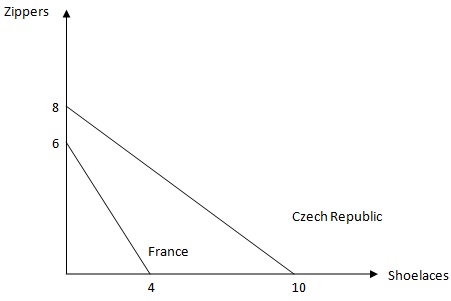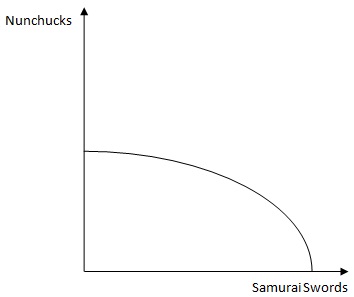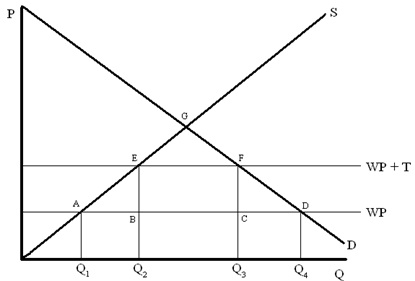Question 1. "The government must keep the price stable," is an example of a
a) normative statement.
b) positive statement.
Question 2. The economy is said to be at full employment when
a) the unemployment rate is zero.
b) the cyclical unemployment rate is zero.
Question 3. Baseball bats and baseballs are complements. When the price of baseballs increases, the demand curve for baseball bats shifts _______?
a) left
b) right
Question 4. Dr. Strumming A. Long is considering leaving his position as a surgeon in Waco, Texas to become a professional banjo player in New York City. The following table indicates his expenses and income for both options. What is the annual opportunity cost of becoming a banjo player for Dr. Long?
|
Expenses and Income (Annual)
|
Surgeon
|
Banjo Player
|
|
Salary
|
$180,000
|
$25,000
|
|
Rent
|
$5,000
|
$9,000
|
|
Transportation
|
$3,000
|
$2,000
|
|
Banjo Equipment
|
0
|
$500
|
|
Banjo Lessons
|
0
|
$800
|
a) $37,300
b) $155,000
c) $159,300
d) $188,000
Question 5. You are given the following information about MacroLand. Last year the government spent $300 on goods and services and collected $50 on taxes. Households purchased goods and services worth $700 and received $500 in wages and dividends. Firms had $100 in investment spending and borrowed $250 last year. The country imported $250 and exported $150. What was the GDP for MacroLand last year?
a) $1000
b) $1500
c) $1800
d) $2000
Question 6. If a point lies outside the production possibility curve it can never be produced.
a) True
b) False
Question 7. The GDP in the US was 6% higher in 2003 than in 2002. Which statement is correct?
a) The value of the production in the US economy increased by 6% from 2002 to 2003.
b) The total cost of US goods and services increased by 6% from 2003 to 2002.
Question 8. In Tropicia, a closed economy, there are 100 people. Except for 10 children and 10 retired people all others are seeking a job when unemployed and 60 are currently employed. What's the current unemployment rate of Tropicia?
a) 20 percent
b) 25 percent
c) 40 percent
d) 66 percent
Question 9. In MacroLand the price index is based upon a market basket of fruit consisting of 3 apples, 5 oranges, and 1 pineapple. Prices are given as follows for the past two years in MacroLand. What is the rate of inflation between 2005 and 2006?
|
Year
|
Price of Apples
|
Price of Oranges
|
Price of Pineapples
|
|
2005
|
$0.25
|
$0.50
|
$2.00
|
|
2006
|
$0.25
|
$0.40
|
$2.50
|
a) -10%
b) 0%
c) 10%
d) 20%
Question 10. Holding everything else constant, if the number of firms making steel increases at the same time the population rises, then the total effect on the market for steel will be:
a) equilibrium price falls, quantity change is indeterminant
b) equilibrium quantity falls, price change is indeterminant
c) equilibrium price rises, quantity change is indeterminant
d) equilibrium quantity rises, price change is indeterminant
Question 11. An industrialized country with an absolute advantage in production cannot gain from trade with a developing country.
a) True
b) False
Question 12. The small island of LaLaLand has an economy consisting of only four companies. The lumber company sells only to the furniture maker or to the home builder. Last year the lumber company sold $10 thousand worth of lumber, while the furniture maker sold $7 thousand worth of furniture and the home builder sold $18 thousand worth of buildings. The last company is a cleaning service that did $2 thousand worth of cleaning last year. What is the GDP for LaLaLand last year?
a) $25 thousand
b) $27 thousand
c) $35 thousand
d) $37 thousand
Question 13. If country A has a labor force of 100,000 people and 75,000 are employed, what is the unemployment rate of county A?
a) 25 percent
b) 75 percent

Use the following production possibilities curve for the next three questions.
Question 14. What is the opportunity cost of producing 1 zipper in the Czech Republic?
a) 4/5 shoelaces
b) 5/4 shoelaces
Question 15. Which country has a comparative advantage in the production of shoelaces?
a) France
b) Czech Republic
Question 16. France wants to trade zippers to the Czech Republic for shoelaces. Which of the following trades would the Czech Republic not accept?
a) 3 zippers for 4 shoelaces
b) 1 zipper for 1 shoelace
c) 6 zippers for 5 shoelaces
d) 7 zippers for 5 shoelaces
Question 17. Which of the following is true?
a) Human choice is generally not influenced by changes in incentives.
b) What is true for the individual must be true for the group as a whole.
c) The economic way of thinking stresses that good intentions usually lead to sound economic policy.
d) Using scarce resources to meet one need reduces our ability to meet needs in other areas.
Question 18. Fill in the blank! Assume we calculate the CPI using 2000 as the index's base year and that the CPI is 120 in 2001 and 132 in 2002. The inflation rate is ______ from 2001 to 2002.
a) 10%
b) 12%
Question 19. Let the market for books in a small open country be given by D: P = 10 - Q and S: P = Q, and let the world price of books be $3. If the government puts a tariff of $4 per unit on books, how much revenue will the tariff raise?
a) $0
b) $16
Answer the next three questions using the information below.
On the small island of Haverland, the domestic market for brooms is defined by the equations:
Domestic Demand: P = 360 - 4Q
Domestic Supply: P = 60 + 6Q
The world price of brooms is $120.
Question 20. If Haverland's economy is closed to trade, what is the equilibrium price in the broom market?
a) $160
b) $200
c) $240
d) $300
Question 21. If Haverland opens to trade, how many brooms will be imported?
a) 50
b) 60
Question 22. If the Haverland government imposes an import quota of 10 brooms, what will be the equilibrium quantity in the broom market?
a) 18
b) 24
c) 30
d) 36
Question 23. Mark used to work as a "card swiper", but after being fired by his harsh boss he doesn't have a job and has lost confidence in finding a new job. Which of the following is true?
a) The National Bureau of Economic Research should include Mark when they are calculating the unemployment rate.
b) Mark is a discouraged worker.
c) Mark is in the labor force.
d) If Mark regains his confidence and tries to find a job again, the number of people in the labor force will fall.
Use the following production possibility frontier graph for the next question.

Question 24. Why is the curve bowed outwards from the origin?
a) Increasing opportunity costs of production.
b) Decreasing opportunity costs of production.
c) The specialization of resources.
d) Answers (a) and (c) explain the shape of the production possibility curve shown in the above graph.
Question 25. If the GDP increases and population decreases what happens to per capita GDP?
a) Increases
b) Decreases
Use the graph below to answer the next question:

In this graph, WP = world price, WP + T = world price plus tariff. The small letters refer to the intersections of the given lines. Note that the picture may not be drawn to scale.
Question 26. What area represents the deadweight loss caused by the tariff?
a) EGF + FCD
b) BEFC + FCD
c) AEB + FCD
d) AEB + BEFC
Answer the next two questions using the following information.
Assume there are only two goods in the economy, apples and bananas. Last year 100 bushels of apples were sold at $40 per bushel and 200 bushels of bananas were sold at $20 per bushel. This year prices of apples increased 10% and bananas prices doubled. As a result of these price changes individuals consumed 200 bushels of apples and only 100 bushels of bananas.
Question 27. What was the change in nominal GDP from last year to this year?
a) $4800
b) $800
Question 28. What was the real GDP growth rate from last year to this year?
a) 0%
b) 10%
c) 25%
d) 60%
Question 29. What are the three basic questions faced by every economy?
a) When, where, and how much will be produced?
b) What, how, and for whom will goods be produced?
Answer the next two questions using the information below.
A brand new season of Survivor has started in Madison WI. Two contestants, Chao and Jeff can either fish or gather berries to eat. They can produce the following pounds of food from fishing or gathering, and any linear combination in between.
|
|
Pounds of Fish
|
Pounds of Berries
|
|
Chao
|
10
|
0
|
|
0
|
4
|
|
Jeff
|
9
|
0
|
|
0
|
3
|
Question 30. Which of the following are true?
a) Chao has a comparative advantage in fishing.
b) Jeff should gather berries.
c) They get the most pounds of food if they both fish all of the time.
d) Answers (a), (b), and (c) are all true.
Question 31. Both decide to split their time between fishing and gathering. When they get back to their camp, Chao returns with 5 pounds of fish and Jeff returns with 3 pounds of fish. How many pounds of berries will they have?
a) 3 pounds of berries
b) 4 pounds of berries